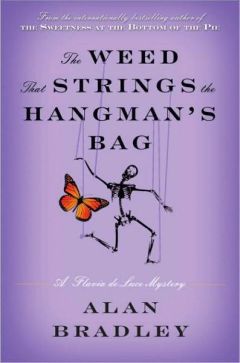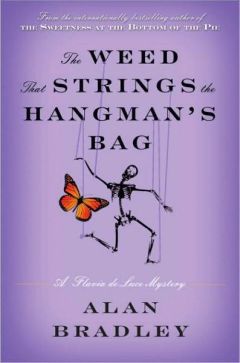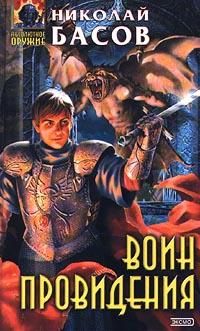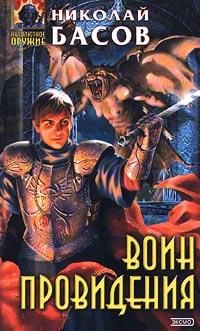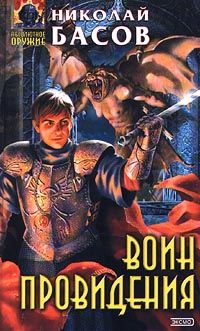Alan Bradley - A Red Herring Without Mustard: A Flavia de Luce Novel
“Here,” I said. “Let me help you. I’m bigger. I can dig faster. Find more sweets.”
I made digging motions with my hands, scooping like a badger.
But Timofey snatched up the lobster pick, and was holding it away from me.
“Mime!” he said around the horehound. “Mime! Timofey foumd it!”
“Good boy!” I said. “Let’s have a look.”
“No!”
“All right,” I said. “I don’t want to see it anyway.”
If there’s anyone on earth who knows the ways of a child’s mind, I thought, it’s me—Flavia de Luce—for I had not so long ago been one myself.
As I spoke, I reached into my pocket and extracted another stick of horehound—this one, my last. I gazed at it fondly, held it up to the sunlight to admire its golden glow, smacked my lips—
“Give over!” the child said. “I wants it!”
“Tell you what,” I told him. “I’ll trade you for that nasty digger. You don’t want that old thing. It’s dirty.”
I pulled a horrid face and went through the motions of retching, sound effects and all.
He grinned, and inserted the prongs of the lobster pick into one of his nostrils.
“No, Timofey!” I said in the most commanding voice I could summon. “It’s sharp—you’ll hurt yourself. Give it here.
“At once!” I added sternly, putting on the voice of authority, as Father does when he wants to be instantly obeyed. I held out my hand and Timofey meekly laid the silver lobster pick across my lifeline—the very part of my hand that the Gypsy—Fenella—was it only three days ago?—had held in her own and told me that in it she saw darkness.
“Good boy,” I said, my head swimming as my fingers closed upon the murder weapon. “Where did you get it?”
I handed him the horehound stick and he grabbed it greedily. I shoved my hand into my empty pocket, as if I were digging into a bottomless bag of sweets.
I locked my eyes with his, noticing, for the first time, the strange transparency of his irises. I would not look away, I thought—not until—
“Danny’s mocket,” he said suddenly, his words oozing out around the sticky horehound.
Danny’s mocket? Danny’s pocket, of course! I was proud of myself.
But who was Danny? It couldn’t be the baby—the baby wasn’t old enough to have pockets. Did Mrs. Bull have an older son?
My mind was buzzing with possibilities as I shoved the lobster fork into my pocket. It was a mistake.
“Mam!” the child shrieked, “Mam! Mam! Mam! Mam! Mam!” each cry louder and higher in pitch.
I scrambled out of the ditch and made for Gladys.
“Mam! Mam! Mam! Mam! Mam!”
The little rotter had been set off like a blasted alarm.
“You!” came a voice from out of the smoke, and suddenly Mrs. Bull was coming towards me, lumbering through the smoldering heaps like something out of a nightmare.
“You!” she shouted, her raw arms already extended, ready to seize me. Once she laid hands on me, I knew, I was done for. The woman was big enough to tear me apart like a bundle of rotten rags.
I grabbed at Gladys and pushed off, my feet slipping wildly from the pedals as I threw myself forward, trying to put on speed.
Oddly enough, I was thinking quite clearly. Should I try to divert her by shouting “Fire!” and pointing at her house? Since the place was surrounded by smoldering rubbish heaps, it seemed both a good and a bad idea.
But it was no time for tactics—Mrs. Bull was bearing down upon me with alarming speed.
“Mam! Mam! Mam! Mam! Mam!” Timofey went on maddeningly from the ditch.
The woman’s huge hands snatched at me as our paths intersected. I needed to get past her to be safe. If she managed to seize even so much as one of my sleeves, I was sunk.
“Yaroo!” The cry came out of me quite unexpectedly, but I recognized it at once. It was the battle cry of a savage—a fierce, fearless bellowing that rose up out of my ancestral lungs as if it had been lying in wait for centuries.
“Yaroo!” I let another fly just for pleasure. It felt good.
Mrs. Bull didn’t stop—but she faltered—missed a step—and I shot past.
I looked back over my shoulder and saw the woman standing in the road, her fists shaking, her red face contorted with fury as she screamed: “Tom, get yourself out here … and bring the ax!”
I sat on the river’s edge letting the water cool my feet. There was an unearthly silence in the Palings, and I shivered a little at the thought of the things that had happened within the past few days. First there had been the attack on Fenella, followed almost immediately by the death of Brookie Harewood. Then, too, Porcelain had told me, just before she’d cleared off, that the police had found the body of a baby—probably the Bulls’ baby—right here in the grove. I suppose I should have felt sorry for the mother. She may have been mad with grief, for all I knew. Perhaps I should have taken my life in my hands and expressed my condolences.
But life is never easy, is it? If only one could make time run backwards, as it does in those short subjects at the cinema where dynamited factory chimneys fall upwards and restore themselves, and shattered bits of glass fly together to form a vase …
In such a world I could, if I wished, bicycle backwards up the Gully, dismount from Gladys, and give the woman a hug. I could tell her I was sorry they’d found the body of her baby buried here in the Palings, and that if there was anything I could do to help, she had only to ask.
I sighed.
Across the river and through the trees, not far from where Fenella’s caravan was parked, I could see a mound of fresh soil. That must be the spot where the body had been found.
Other than the fact that she’d seen the baby’s foot—“Wrapped in a carpet, or something,” she had said, “a bundle of old green bones”—Porcelain hadn’t given me any more of the details. And it was too late now—Porcelain was gone.
I could hardly ask Inspector Hewitt about the discovery of the body, and until I had the opportunity to find out from Mrs. Mullet what the village was saying, I was on my own. I would wade across and have a look.
The river was not very deep here. The Hobblers, after all, had been coming to this spot for centuries to baptize their babies. The water was of just sufficient depth for a good old ducking, and I was no more than a hundred feet from the disturbed spot where the police had evidently made their gruesome find.
I hitched up the hem of my dress a couple of inches and started across.
Even a few feet out from the bank, the water grew noticeably colder on the bottom as I waded slowly towards the center, my arms widespread for balance, taking great care not to lose my footing in the ever-strengthening current.
Soon I was at the halfway point—and then I was past it. The water level had receded to just below my knees when I stepped on something hard, stumbled, missed my footing, and went flailing tail-over-teakettle into the water. Total immersion.
“Oh, rat spit!” I said. I was furious with myself. Why hadn’t I taken Gladys and walked her across the little bridge?
“Double rat spit!”
I scrambled to my feet and looked down at myself. My dress was completely soaked.
Father would be furious.
“Damn it all—dash it all, Flavia,” he would say, as he always did, and then would begin one of those silences between us that would last for several days until one of us forgot about my offense. “Being at loggerheads,” Daffy called it, and now, as I stood knee-deep in the water, I tried to imagine that I had been suddenly transported to a cold, rushing river somewhere in the Canadian north woods, with the severed heads of the loggers bobbing past me in the current like bloated, grizzled apples.
But practicality brought me back to Bishop’s Lacey. I knew that when I got home to Buckshaw, I would have to sneak into the house, make my way upstairs, and rinse out the dress in the sink of my laboratory.
In the water, the little cloud of mud stirred up by my feet was clearing quickly.
It was odd—although I could easily see the tops of my feet on the river’s bed, there were no stones in sight. And yet I had certainly tripped on something hard. I had nearly broken a toe on the stupid thing. As I had done before!
I stood there for a moment, already feeling a chill in the September air.
Something in the water shifted: a bubble … a ripple of water … of light.
Slowly I bent at the waist and reached carefully into the river’s depths.
A little deeper … a little farther to the left. Although I couldn’t see it, my fingers closed around something hard. I took a firm grip and lifted it towards the surface.
As the object came up towards me through the water it became visible. It was eerie.
Hard … transparent … invisible in the water … becoming visible as it came into the air.
A sudden sinking feeling told me that my heart already knew what the thing was before my head did, and both had already begun to pound as I realized that the object I was holding in my streaming hands was Fenella’s crystal ball—the ball with which some unknown person had bashed in her skull: the ball with which someone had tried to kill her.
The thing had been lying on the river bottom for days, its transparency making it invisible in the water even though it was in plain sight. No wonder the police had missed it!
Only if they had waded around in the shallows—and only then if they had stepped upon it by accident, as I had—would they have found the object of their search.
I would, of course, take it to Inspector Hewitt at once.
As I climbed the bank, I noticed that a silence had fallen upon the Palings, as if the birds were afraid to make even a peep.
The crystal ball was cold in my hands, refracting distorted images of earth, trees, and sky, its swirling colors like dye dropped into water.
If it hadn’t been for the glass, I might have missed the flash of blue among the trees—a color that didn’t belong there.
I stopped in my tracks as if preoccupied. Don’t look directly at it, I thought.
I twisted the hem of my dress uselessly, as if trying to wring it dry, then made a little hammock of the material in which to sling the crystal ball.
Would my wet hands leave fingerprints? Who knew? It was the best I could do.
“Blast it all!” I said loudly, more for effect than anything, but signaling that I thought I was alone.
With my peripheral vision, I could see that there was a swatch of color among the bushes. By shifting my gaze slightly, I could see that it appeared to be a scarf—a flowered scarf.
Could it be one of the pixies Daffy and Feely had told me about—one of those malevolent water sprites that stole babies? Perhaps it was the very one that had taken Mrs. Bull’s child! But no … pixies didn’t exist. Or did they?
I let my eyes drift slowly to the right.
Quite abruptly, as if by magic, an image snapped into place. It was like one of those optical illusions in The Girl’s Own Annual in which a silhouette of two faces in profile is suddenly seen to be an egg cup.
Gray hair … gray eyes, staring straight at me … a scarf at the throat … riding breeches—even the monocle hanging by a black cord round the neck.
It was Vanetta Harewood’s companion, Ursula, standing motionless among the bushes, counting on the camouflage of stillness to keep me from spotting her—Ursula who gathered willow withies from the riverbank to twist into her dreadful baskets.
I let my eyes meet hers, then drift away, as if I hadn’t seen her. I looked to her right—to her left—and finally above her, letting my mouth fall open slackly.
I scratched my head, and then, I’m afraid, my bottom.
“I’m coming, Gladys,” I shouted. “It’s only a squirrel.”
And with that, I made off across the bridge, muttering away to myself like the mad daughter of an eccentric squire.
Damn! I thought. I hadn’t had a chance to examine the police diggings.
Still, my day had been remarkably productive. In my pocket was the silver de Luce lobster pick that I was quite sure had been used to put an end to Brookie Harewood, and cradled in my skirt, the crystal ball that was almost certainly the object with which Fenella had been bashed. After all, if it wasn’t, then why would it have been tossed into the river?
An idea began to take shape.
Of course I would hand over these weapons at once to Inspector Hewitt—I had planned to do so all along, for various reasons.
But first, I wondered, was it possible to retrieve fingerprints from an object that had been immersed for days in running water?
TWENTY-THREE
I HAD CLIMBED NO more than a dozen stairs when Father’s voice, from somewhere below me in the foyer, said, “Flavia—”
Thwarted!
I stopped, turned, and came down one step out of respect. He was standing at the entrance to the west wing.
“My study, please.”
He turned and was gone.
I trudged down the steps and trailed along behind him, making a point of hanging well back.
“Close the door,” he said, and sat down at his desk.
This was serious. Father usually delivered his little lectures while standing at the window, gazing out into the grounds.
I perched on the edge of a chair, and tried to look attentive.
“I’ve had a call from Nurse Hammond on the—” He pointed in the general direction of the telephone, but could not bring himself to say the word. “… instrument. She tells me that you took Dr. Kissing out into the rain.”
The hag! I’d done no such thing.
“He wasn’t in the rain,” I protested. “He was sitting under an umbrella on the lawn, and he was already outside when I got there.”
“It makes no difference,” Father said, holding up a hand like a policeman directing traffic.
“But—”
“He’s an old man, Flavia. He’s not to be bothered with nonsensical intrusions upon his privacy.”
“But—”
“This gadding about the countryside must stop,” he said. “You’re making a confounded nuisance of yourself.”
A nuisance! Well!
I could have spat on his carpet.
“I’ve given this a great deal of thought recently,” he said, “and come to the conclusion that you have far too much time on your hands.”
“But—”
“Part of that is my own fault, I’ll admit. You’ve not been provided with sufficient supervision and, as a result, your interests have become rather—unhealthy.”
“Unhealthy?”
“Consequently,” Father plowed on, “I’ve decided that you need to be more among people—more in the company of your peers.”
What was he talking about? On the one hand I was wandering about the village excessively, and now, on the other, I was in need of human companionship. It sounded like something you might say about a rogue sheepdog.
But before I could protest, Father took off his glasses, very deliberately folded their black, spidery arms across the lenses, and put them away in their hard-shelled case. It was a sign that the conversation was nearing its end.
